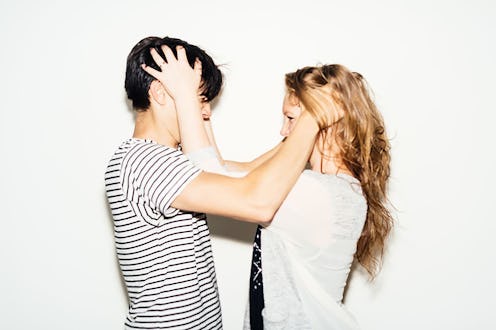Style
This Is How An Expert Says You Should Change Your Hair Routine Based On The Season

March is one of my favourite times of the year. The flowers start to come out, blossom appears on the trees, and the weather starts getting a little bit warmer. It means one thing: spring has well and truly sprung and summer is a little bit closer. Changing up your wardrobe at this time of the year seems completely normal. But what about the rest of your beauty routine? Does the change in season affect your hair? Changes in your hair texture can really throw your routine off balance and if you are anything like me, time is of the essence when it comes to looking like your best self. I spoke to an expert about how to handle troublesome locks when the season is changing and you’re not sure why your hair is too.
Everything from temperature to pollution can contribute to changes in your skin and body. Your hair is included in that. Trichologist Anabel Kingsley from hair specialists, Philip Kingsley says, “atmospheric moisture content (AKA humidity) has a huge impact on the appearance and manageability of your hair. The more humid it is, the more likely it is your hair will frizz.”
Many of us have to deal with our hair going frizzy and it can be super annoying. However, it isn’t completely simple. In fact there is science behind your frizz. Kingsley says, “your hair contains bonds called ‘hydrogen bonds’. These are weak bonds that are easily broken by water and then reset upon drying. This is, on the one hand, very handy as you can set your hair into almost any style when you dry it from wet with heated styling tools.” She continues:
“However, hydrogen bonds are not always broken and reset when you want them to be; they are also broken by water in the atmosphere, and subsequently reset themselves into undesirable configurations upon drying. Therefore, in particularly humid seasons like the summer, you are very likely to find your strands kink and frizz progressively throughout the day.”
So, why is it that my hair tends to get frizzier in the winter. Kingsley tells me, “your hair can also frizz if you wear warm hats. This is down to the water content in sweat! Static hair is also a common winter hair woe.”
The changes in season have a pretty fundamental affect on your hair. Shaking up your hair care routine is one way to combat dry, frizzy, or greasy hair. However, Kingsely points out that there is a one size fits all cure, “during the summer, when UV rays are at their strongest and you are exposing your hair to more sun, hair has a tendency to become dry and brittle. This is because UV rays act on strands much like bleach. The most obvious symptom of sun exposure is a fading of hair colour; UV rays (like bleach) oxidise hair pigment cells (melanin).”
“UV rays can also degrade the protein of your hair, making it more fragile and prone to breakage. Chlorinated and salt water are equally drying and can add to problems.”
While summer can wreak havoc on your hair winter brings its own set of problems. Kingsely says, “winter often spells trouble for the scalp. We see many more cases of flaky/itchy scalps in winter than any other season. A flaky scalp can cause extra hair fall, so it is important to address any scalp irritation ASAP. I recommend daily use of our Flaky/Itchy Scalp Shampoo until your symptoms clear.”
Dealing with hair and scalp problems can be super annoying when you are at a loss as to how to treat it. However, getting your hair back to its normal, luscious state doesn’t have to be too complicated. In fact, incorporating a new hair regime into your beauty routine really makes you feel like you are getting the self-love you deserve.
Kinglsey says, “ I recommend using UV protective products in the summer to shield your hair from sun damage. Your hair can burn just like your skin – you simply cannot feel it. I suggest all of my clients use our Swimcap Cream for days at the beach or when they swim. Originally formulated for the US Olympic Synchronized Swim Team, it guards hair from UV rays, as well as salt and chlorinated water. As an added benefit, Swimcap acts as a moisturizing treatment.” Well, if it is good enough for the pros it is definitely good enough for me. To counteract frizzy hair Kingsley recommends you “use lightweight creams or serums that create a barrier between your hair shaft and water in the atmosphere.”
Good hair days can leave you feeling (and looking) like the boss that you really are. But by the same token, when your hair just isn’t work for you, looking damaged or getting greasy way too quickly it is really irritating. If you are having some common seasonal problems with your hair Kingsley offers this advice:
For greasy hair: "Wash it. Apply the same thinking to hair/scalp as you do to your face. i.e. If your face were to become greasy, you would cleanse it! You can also use a daily scalp toner containing an astringent ingredient, such as Witch Hazel, to help manage oiliness (PK Scalp Toner)."
For dry hair: "Firstly, find out why your hair is dry in the first place so you can prevent it from happening again. Perhaps you have been heat-styling on too high a heat setting, or you have been colouring your hair too often. Or perhaps you have had time in the sun and have not protected your hair from UV rays. Whatever the cause (or causes), you can take steps to minimise dryness in the future.
"To immediately add moisture back-into your hair, use a pre-shampoo conditioning treatment twice a week. Once your hair is in better condition, you can reduce your application to one time weekly."